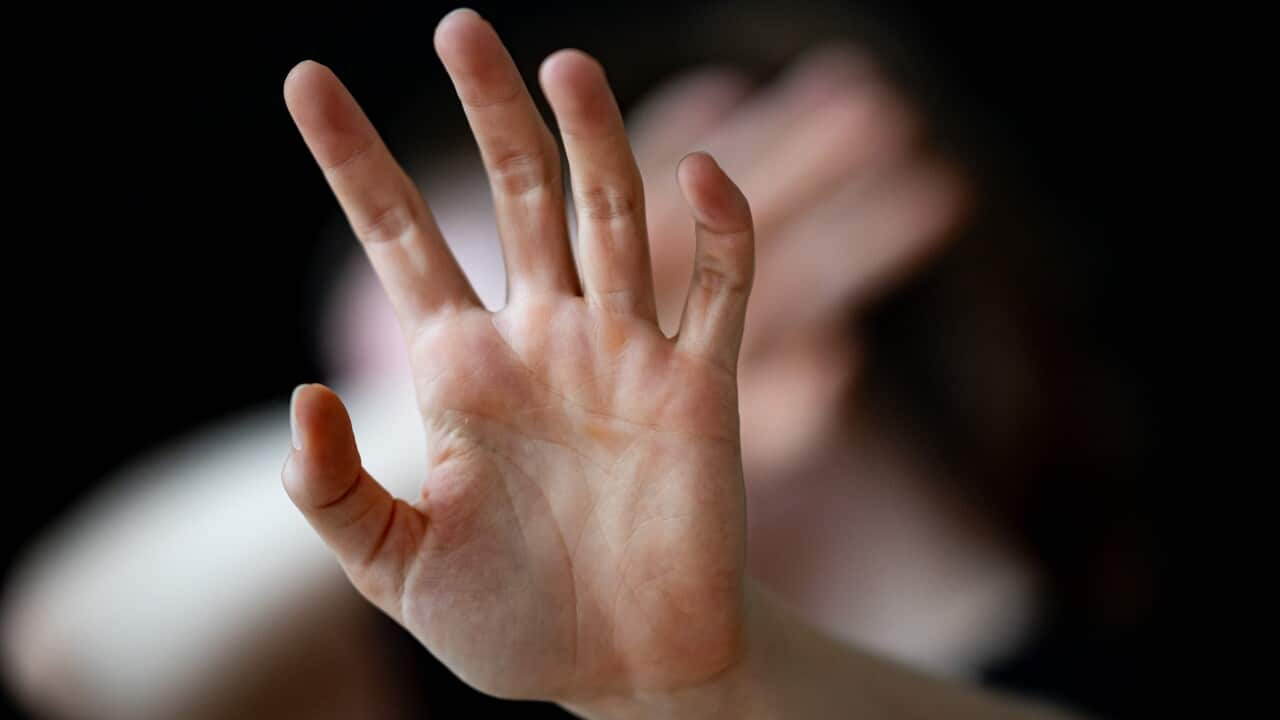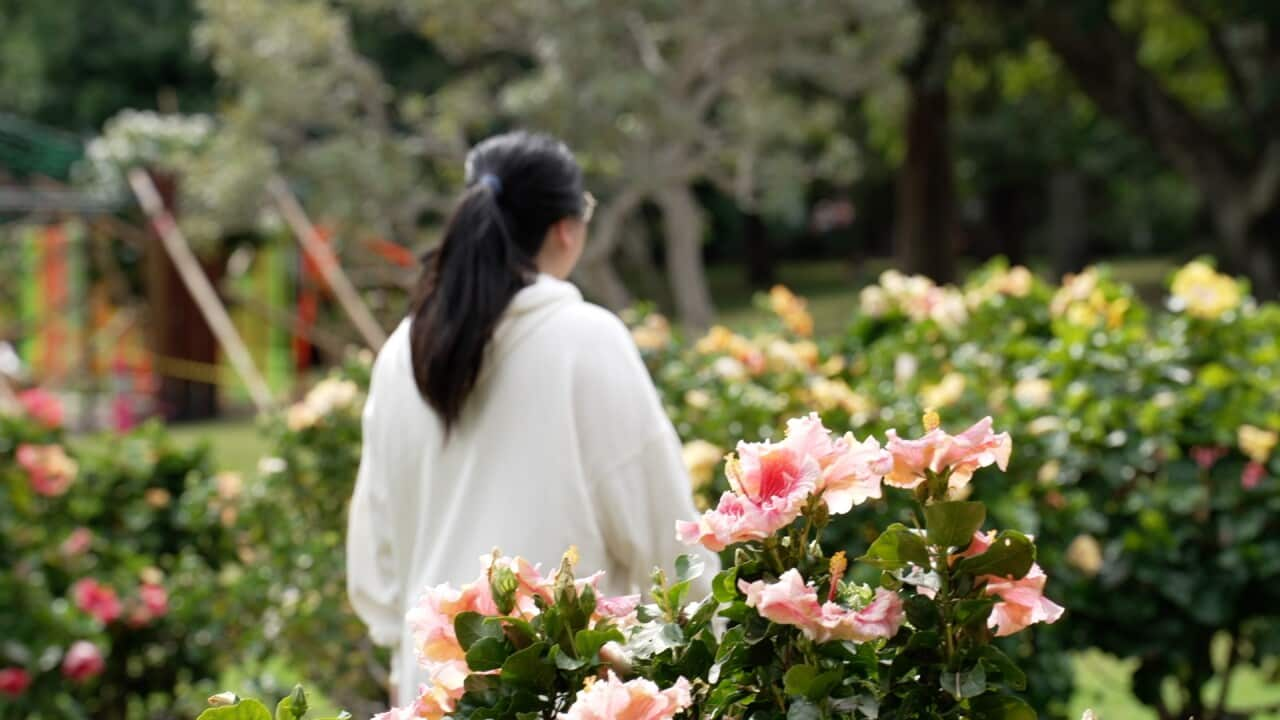

7 min read
This article is more than 1 year old
Feature
Maya's marriage turned into a nightmare. Women like her are being left out in the cold
Women fleeing domestic violence are being forced onto the already strained rental market, due to a shortage of shelter accommodation.
Published
Updated
By Sandra Fulloon
Source: SBS News
Image: As Australia's cost of living and housing crises continue, calls to domestic violence helplines have soared. (SBS News)
This article contains references to family and domestic violence, and sexual assault.
‘Maya’ – not her real name - is a . She has struggled to get back on her feet, after the dream of a new life in Australia turned into a nightmare.
After arriving in Australia as a new bride, Maya tells SBS News she was held as a virtual hostage for almost five months.
“I felt very scared of [my ex-husband], because he was fighting with me badly,” she says.
“He did the same thing every day – arriving at the house for two hours and then trying things sexually. If I denied him, he fought with me, slapping and kicking my stomach. Then he would push me onto the mattress, and then leave.
“He told me I cannot go outside, even outside the room.”
Maya had married a man of her choice, rather than agreeing to an arrangement. Her large family in India reluctantly agreed to the union.
“I didn't want to come overseas, but I came here only for him,” Maya says.
“This country was new for me. And then three or four days [after I arrived] he started bad things with me.”
With limited English language skills, and separated from family and friends, Maya says she endured worsening abuse and did not know she could call triple-zero for help.
“When he was fighting with me, my ex-husband always told me: ‘I am a citizen here, you can't do anything, you can't call to the police’.
“I felt very scared because I was alone here. It was very hard for me.”
Domestic and family violence is one of the leading causes of for women and children, according to counselling and advocacy service Full Stop Australia.
As worsen, calls to its national helpline are rising steadily.
“This year we are seeing 15 to 20 per cent increase in call demand,” says acting CEO Tara Hunter.
“When we see increased stress in households, we do see an increased number of people presenting for domestic and family violence.
“This is a national crisis and we absolutely need to act straight away. And it's not just about having a policing response. We need to resource the system.”

Tara Hunter, acting CEO of Full Stop Australia. Source: Supplied
“That is creating a strain for [victim-survivors], both keeping safe and, more importantly, being able to recover.
“A shortage of accommodation means that people feel that they cannot leave the violence, or they may go into emergency accommodation and feel forced to return back to unsafe housing.
“So, we actually need resourcing around this, and we need to address some of that rental stress.”
Most women’s shelters are full, and demand for places is rising, Hunter says.
One shelter on Sydney’s North Shore that relies on private funding was recently forced to relocate its residents during emergency repairs.
“There was black mould everywhere. There was a lot of water damage, a lot of rotten wood,” says Catherine Knox, chair of the Hornsby Ku-ring-gai Women’s Shelter.
“So, we have been desperate for funds to help us do that building work because we need to provide a safe and secure home.”
The two-storey suburban house can provide short-term accommodation for up to eight women, and is usually full. Women stay until they become financially independent and can pay for a home of their own.
“All have escaped domestic violence situations or have been homeless,” Knox says.
“When women arrive here they are usually quite traumatised after living in fear, often for a long time.”
Maya is grateful to have found sanctuary in a women’s shelter, after finally fleeing her abuser, and is gradually recovering her health.
“For several months, during the abuse, I hardly ate anything. So, my condition was very bad. Finally, I told my friends in India about what was happening.
“They suggested I call triple-zero and I did, and then I ran to the police station."
Many victim-survivors fear leaving an abusive situation and women from migrant backgrounds face other hardships, according to professor Manjula O'Connor, a psychiatrist specialising in gender-based violence.
“Migration makes women more vulnerable. They have less knowledge, less access. They are often isolated. They often don't have the support networks that their families could provide back home.

Dr Manjula O’Connor specialises in gender-based violence. Source: Supplied
, nearly one in four (23 per cent ) of women aged 15 and older in Australia have experienced violence by an intimate partner.
O’Connor says survivors in Australia on temporary visas are especially vulnerable because their visa status can be used against them.
“If the husband is their sponsor then often he knows a lot more about the system,” O'Connor says.
“That means he has a lot of power and often, one of the tricks the perpetrators use is to remove sponsorship for the residency visa.”
O’Connor says women from some cultures, including India, are often afraid or unable to return to family in their home country if marriages break down.
“There is a lot of stigma and shame that this marriage has failed and that the woman will be divorced, and then that puts a black mark on their family.
“It may mean the younger sisters may not get married because it looks like this is not a successful family. So, it is a highly stressful situation.”
The federal government recently granted temporary visa holders fleeing domestic violence the same support as Australian citizens, with payments rising from $3,000 to $5,000. Even so, O’Connor says more support is needed.
“There are not enough safe houses to put these women into. So, what happens is that the women have to share a bedroom with someone and that is not an ideal situation.
“And sometimes the women return to their perpetrators.”
Maya lives in a rented share-house now with other women from India. She also has a refugee visa and a part-time job.
And she is grateful for the support that helped to turn her life around.
“People have helped me a lot, encouraging me to work here, study here. Now I can move on.”
If you or someone you know is impacted by family and domestic violence or sexual assault call 1800RESPECT on 1800 737 732 or visit . In an emergency, call 000.





